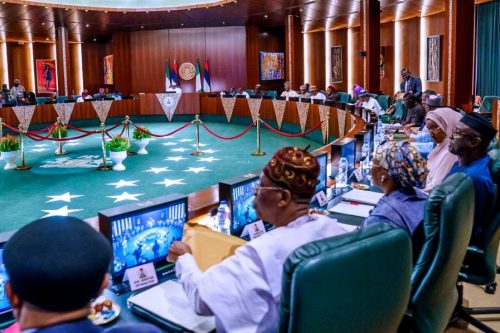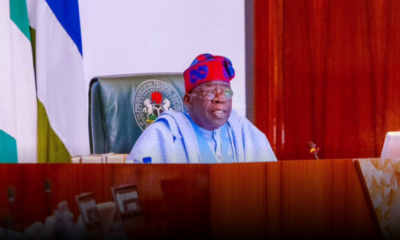The Catholic Bishops’ Conference of Nigeria, the Sultan of Sokoto, Alhaji Abubakar Sa’ad all- led Jamaatul Nasril Islam, some state governments, and the Manufacturers’ Association of Nigeria have taken a swipe at the Federal Government over its failure to address the rising insecurity in the country.
The groups stated this on Monday as killings and other forms of insecurity took a toll on investments in the country with foreign investors shunning 24 states in 2021.
Earlier on Monday, the National Bureau of Statistics released data, which indicated that Nigeria generated a total of $698.7m from Foreign Direct Investments in 2021.
According to data from the NBS, the FDI generated in 2021 was the lowest the country recorded in 10 years.
FDI is one of the three major types of investments and a critical source of capital inflow into the country.
Other sources include foreign portfolio investment, foreign loans, and trade credits, among other investments.
NBS defines FDI as an investment whereby the investor has some control or a significant degree of influence on the management of a domestic enterprise.
It notes that the FDI occurs when the investor has enough equity in the enterprise to entitle them to 10 percent or more of the voting rights in that company.
A breakdown of FDI in Nigeria over the last 10 years shows that in 2012, FDI stood at $2.60bn, it declined to $1.27bn in 2013 but rose to $2.27bn in 2014.
FDI fell again in 2015 to $1.41bn; it fell further to $1.04bn in 2016 and $981.75m in 2017.
Further analysis of data from the NBS revealed that the FDI rose again to $1.19bn in 2018 but dropped by $256m to $934.34m in 2019.
The latest capital importation report from the bureau stated that the FDI fell by $332m to $698.78m in 2021 from $1.028bn in 2020.
24 states attracted $0 foreign investments
The report also revealed that 24 states in the country failed to attract any foreign investment last year.
These states are Adamawa, Bauchi, Bayelsa, Benue, Borno, Cross River, Ebonyi, Edo, Enugu, Gombe, Imo, Jigawa, Kaduna, Katsina, Kebbi, Kogi, Nasarawa, Niger, Ondo, Plateau, Sokoto, Taraba, Yobe and Zamfara.
Also, 10 out of the 24 states failed to attract foreign investments in the last three years.
The states are Bayelsa, Ebonyi, Gombe, Jigawa, Kebbi, Kogi, Plateau, Taraba, Yobe, and Zamfara.
Manufacturers blame insecurity
The Chairman, Infrastructure Committee of MAN, Ibrahim Usman, said that aside from the COVID-19 pandemic that affected several companies abroad, there was the issue of insecurity plaguing the country
He said, “Since the COVID-19 pandemic, a lot of the companies that invest abroad have been affected by the pandemic. That is a major cause. Secondly, the insecurity in the nation has continued to go unabated. Nobody wants to invest in a country where there is so much insecurity. Investments thrive only where there is peace and security.”
Issue of foreign exchange, policy somersault invest in Nigeria risky – MAN
Usman also said that the lack of stable power supply is affecting the productive sector, which is meant to attract foreign investments.
“Also, the availability of electricity is directly related to the advancement in terms of investments. People normally invest in the productive sector. The productive sector cannot operate without adequate reliable, affordable electricity. That’s another major cause. We haven’t made the stride we are supposed to have in terms of electricity supply. The Nigerian electricity supply industry is still at the lowest point,” Usman said.
He added that there was also the issue of foreign exchange and lack of consistent policies, which had made investing in the country highly risky.
Usman added, “Also, there is the issue of foreign exchange. A lot of times we do policy somersault. The government can suddenly come up with a new policy that discourages investors. There must be consistency in policymaking because investors plan 10-20 years, and sudden changing policies can affect their investments.”
Exchange rate affecting business – LCCI
Also, the Deputy President of the Lagos Chamber of Commerce and Industry, Gabriel Idahosa, identified three factors responsible for the steady decline in Nigeria’s FDI.
According to him, the major factor is the unpredictability of Nigeria’s foreign exchange market and the devaluation of the naira.
He explained that foreign investors were skeptical of investing in Nigeria because the value of their returns would have declined in the future due to the naira devaluation.
“Since 1990, the value of the naira has been on the decline and projection shortly is not showing any significant difference,” he said.
Idahosa, who is a chartered accountant, noted that investors were also reluctant to invest in a country where the cost of doing business is high. He explained that the high cost of electricity in Nigeria and inefficient port and rail systems were undoing Nigeria and its quest for FDI.
“Also, our Company Income Tax is among the highest in the world. Most countries have 15-16 percent or thereabout, but ours is 32.5 percent. Most investors are going to places where taxes are low and moving to countries where governments are looking at the number of jobs created rather than high taxes,” Idahosa noted.
He urged the Nigerian government to address these challenges urgently to drive FDI into Nigeria.
The Managing Director of Cowry Asset Management Limited, Johnson Chukwu also said that investors were looking for countries with economic and political stability, and good economic growth.
According to him, the country experienced contracted growth due to the pandemic and is also battling insecurity, which has been discouraging foreign investments.
Chukwu said, “Foreign Direct Investments go into countries with very good investment climate. Among those things that foreign investors are looking for is economic and political stability. They are also looking at the growth of the economy. Before last year, the economy contracted in 2020. Although it grew by 3.4 percent last year, investors were looking at a contraction in 2020.
“Secondly, we see a situation where the level of insecurity is high in the country. This discourages foreign investors.”
The Chief Executive Officer, Centre for the Promotion of Private Enterprise, Dr. Muda Yusuf, stressed the need for better reforms to strengthen investors’ interest.
He also emphasized the need to address the issue of insecurity plaguing the country.
Benue blames insecurity, says investors shun FG too
On his part, the Benue State Commissioner for Finance, David Olofu, also blamed the Federal Government.
Olof said security challenges facing the country prevented investors from coming to invest in the state in 2021.
He stated, “It is obvious that insecurity prevented many states from attracting investors in 2021. How many investors did the Federal Government attract?
“How will investors come even when citizens are not safe? How will investors come when citizens cannot themselves invest in their place? “
Investors made inquiries, but never turned up – Zamfara
The Managing Director, Zamfara State Investment Cooperation, Dr. Anas Hamisu Lawal, also said security challenges were responsible for the non-attraction of investors in the state.
Hamisu maintained that there were several requests from the investors wishing to come to Zamfara, adding, “The first question they always ask is the security situation in the state.”
According to him, the state has currently four requests from investors who want to come to the state to invest, adding, “They are willing to invest whenever the security situation improves.”
But the Gombe State Commissioner for Information, Julius Ishaya, debunked the insinuation that the state failed to attract investments in 2021, stressing that the state had never had it so good since the administration of Muhammadu Yahaya.
Also, the Secretary to the Plateau State Government, Prof Danladi Atu, dismissed the NBS claim as untrue and urged the Federal Government agency to always verify its facts.
But the Special Adviser to the Enugu State Governor on Information, who also oversees the Ministry of Information, Mr. Steve Oruruo, told one of our correspondents on the telephone that the state had been working assiduously to create a stable and secured environment for businesses to thrive, and that had placed the state as the most secured state in the South- East.
Nigeria heading towards multiple chaoses – JNI
The JNI, in a statement by its Secretary-General, Dr. Khalid Abubakar-Aliyu, condemned the recent attack on the Abuja-Kaduna rail and warned that Nigeria was heading towards multiple chaos.
It stated, “To say the least Jama’atu Nasril Islam (JNI) is agonized and short of words to express herself over the gory incident of the infamous train attack which happened on Monday, March 28, 2022.
“The well-orchestrated incident remains highly condemnable, reprehensible, and upsetting to every rational mind. It appears that the continuous callous acts of mayhem, killings, and arson happening almost on daily or weekly bases around us; either within communities and/or on the roads we ply, have automatically reset our human psyche that we now have accepted such dastardly acts as part of our lives, to the extent that we no longer feel them. The humanity in us is slowly being eroded thereby making us adapt to the new normal within which we, unfortunately, found ourselves.”
Catholic bishops berate FG
Catholic bishops in a statement by the National Directorate of Social Communications, Catholic Secretariat of Nigeria, in Abuja, said the security apparatus lacked intelligence or the ability to fight and defeat terrorists in our nation.
“Nigerians are sick of flimsy excuses and bogus promises of the government to deal with terrorists,” they added.
Summon northern stakeholders meeting on insecurity, CAN tells Buhari
The News Agency of Nigeria reported that the Christian Association of Nigeria, Northern chapter, called on the President, Major General Muhammadu Buhari (retd.), to summon a meeting of northern stakeholders to proffer solutions to the challenges of insecurity in the north.
Reverend Yakubu Pam, Chairman of CAN of 19 northern states including the Federal Capital Territory, made the call while declaring open the association’s 2022 first quarter National Executive Meeting on Monday in Abuja.
Pam also urged the President to seek assistance from former heads of state in addressing the insecurity in the region.

 BIG STORY3 days ago
BIG STORY3 days ago
 BIG STORY5 days ago
BIG STORY5 days ago
 BIG STORY4 days ago
BIG STORY4 days ago
 BIG STORY5 days ago
BIG STORY5 days ago
 BIG STORY22 hours ago
BIG STORY22 hours ago
 BIG STORY4 days ago
BIG STORY4 days ago
 BIG STORY2 days ago
BIG STORY2 days ago
 BIG STORY3 days ago
BIG STORY3 days ago






















